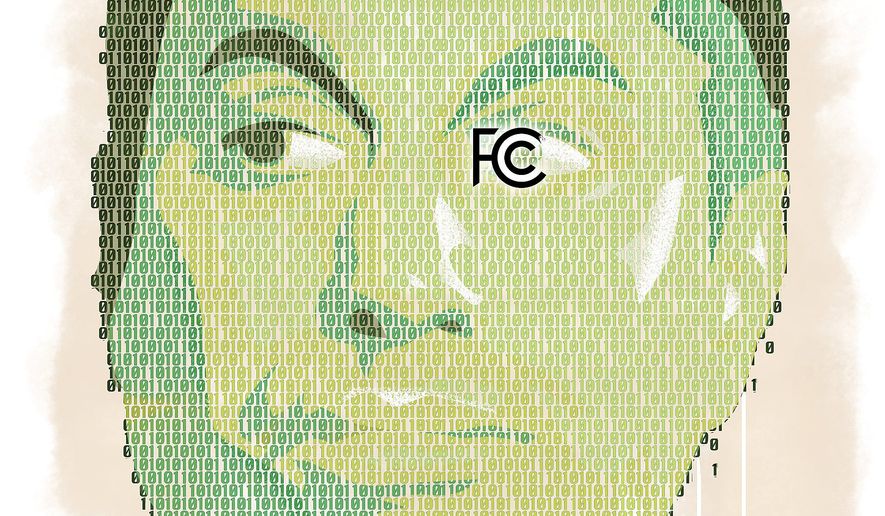OPINION:
One of President Trump’s less publicized appointments also happens to be one of his best: Ajit Pai as the new chairman of the Federal Communications Commission (FCC) is a cause for celebration. Mr. Pai possesses not only a keen legal mind and a great familiarity with the intricacies of the FCC’s current operations, he also favors new policies that are friendly to both the short- and long-term interests of consumers. His appointment heralds a welcome return to the pre-Obama era of the FCC, when the internet grew strong because of a bipartisan policy favoring a light touch of government regulation.
Since becoming an FCC commissioner in 2012, Mr. Pai has advocated policies that increase consumer choice in telecommunications and opposed regulations that would limit choice. Foremost among these efforts was his fight against the commission’s use of Title II regulations to limit the capabilities of internet Service Providers and implementing so-called net neutrality.
Mr. Pai has rightly described net neutrality as a “an overreach that will let a Washington bureaucracy, and not the American people, decide the future of the online world.” President Obama pushed a reluctant FCC to pursue this more heavy-handed internet regulation agenda. Mr. Pai will now have the power to roll back these policies.
Mr. Pai has also fought the agency’s efforts to prohibit popular services like “zero rating,” a product that offers consumers free access to certain content without affecting their data use. Video streaming services are big users of data, and zero-rating models — such as Verizon’s NFL Mobile app, AT&T’s DirecTV Now streaming program, and T-Mobile’s Music Freedom and Binge On — benefit consumers by removing the burdens on their data plans. They also give low-income consumers access to content that may have been out of reach before.
In the FCC’s order on net neutrality, the agency had initially stated it would evaluate zero-rated plans on a case-by-case basis, allowing them under the order only if they complied with five different FCC rules. Then, this past December, former FCC chairman Tom Wheeler wrote a letter to an AT&T executive asserting that AT&T’s zero-rating plans “inhibit competition” and “harm consumers,” and alleging that offering consumers the ability to watch video data-free favors AT&T and its affiliates over other content providers.
In response to this criticism, Mr. Pai called Mr. Wheeler to task for pursuing a midnight regulatory action and launching “yet another broadside against free data for consumers, notwithstanding the objections of Republican commissioners.” That response to Mr. Wheeler demonstrates that Mr. Pai has the sense to defend consumer choice and innovative competition between service providers, and the independence to challenge authority when necessary.
Now that he is chairman, Mr. Pai should also consider the role the commission will play in developing our communications infrastructure, a vital component of America’s digital future. A recent FCC report on this topic points to three measures that will promote private-sector investment: some direct federal funding to reduce costs, changes to the tax code to improve return on investment, and improvements on the productivity and efficiency of investment.
This investment would complement Mr. Trump’s stated goal to spend $1 trillion on infrastructure. Mr. Pai has said the key to pursuing 5G spectrum technology, another critical part of our future communications infrastructure, lies in “freeing up more spectrum, removing barriers to infrastructure deployment, and encouraging innovation and investment in the network and mobile technologies,” mirroring the commission’s recent recommendations.
As chairman, Mr. Pai is correct to highlight the importance of infrastructure investment by internet Service Providers. We can thank the investments these providers have made in the past for today’s high-speed internet but, due to heavy-handed Title II regulations, these investments can no longer be guaranteed. Title II already appears to be decreasing the investment in networks made by providers as a percent of their revenue.
In his letter responding to the FCC’s criticism of zero rating, Mr. Pai made it clear that any action undertaken by Mr. Wheeler’s FCC can be undone by a future commission. Now that Mr. Pai is running the agency, he will have a chance to overturn burdensome regulations, restore consumer choice, and drive investment in our digital future.
• Joe Colangelo is president of Consumers’ Research, the nation’s oldest consumers organization.




Please read our comment policy before commenting.